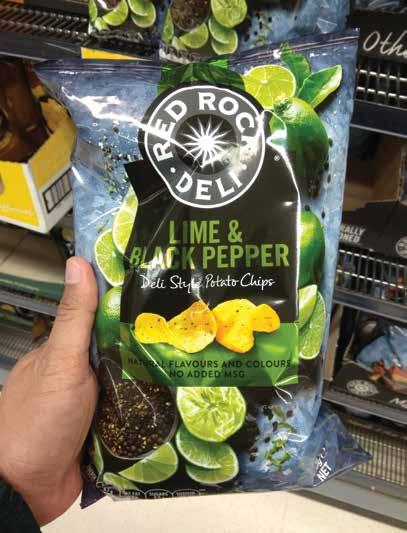
8 minute read
THOUGHT LEADERSHIP
Branding and supply chain: why they matter
Getting your branding and supply chain right are critical in the food and beverage industry, especially if companies are looking to export to lucrative overseas markets. Food & Beverage Industry News finds out from PepsiCo the role of these two important aspects of doing business overseas.
Danny Celoni is the Australasian CEO of one of the most recognisable names on the planet – PepsiCo. Having more than 22 years’ experience in sales, strategising and marketing throughout the Pacific and Asian regions, he is in a good place to see where Australian brands fit. Not only in terms of names themselves, but perceptions, too.
“[I think] Brand Australia has a lot of equity with a lot of our brands,” he said at the recent Global Food Forum held in Sydney. “PepsiCo has a huge snack portfolio including the likes of Red Rock Deli chips and Twisties and we are seeing Brand Australia becoming more prominent. We are well placed from a value-add perspective. It’s all about quality, food security, consistency – they’re core elements that make Brand Australia prevalent.”
Appearing on stage with Celoni was Sir Rod Eddington, who, among other things, is the non-executive chairman of brewery giant Lion. A Rhodes Scholar who attended Oxford, Eddington is a strong believer in having big ties to Asia. His Grand Cordon of the Order of the Rising Sun awarded to him by the Japanese government in 2015 for his contribution to strengthening economic relations between Australia and Japan is proof of that. And although he is a champion of local produce, he is slightly less optimistic about Australia’s brand presence. He believes Australian food producers have a way to go in the branding stakes. He cites Australia’s neighbours across the Tasman, and a home-grown example, as a prime illustrations of how Australia should be positioning itself.
“We have a long way to go on Brand Australia to be frank,” he said. “The Kiwis have done a brilliant job. The 100 per cent Pure New Zealand brand is a very good one.
“The part of Australia that is probably closest to being in the right space is Tasmania. Tasmania has built a reputation for itself, over a long period of time, not only as a producer of world-class wool, but of world-class seafood and vegetables. I think there is some real examples
to be taken from Tasmania. As good as Australian food is, it still doesn’t have an overarching brand with the quality that the Kiwis have delivered.”
Eddington also made it very clear that the supply chain has to be up to scratch. If it’s not, then it doesn’t matter how high-quality your food or beverage is, you will make no inroads into some of the more fickle, but lucrative, markets.
“If you are exporting fresh and chilled products including cold foods, then supply chain is critical,” said Eddington. “An hour on the tarmac in the sun can destroy the product. As a company, we are really focussed on what supply chains are best and there are plenty of places
Having decent cold storage facilities at international airports like Sydney, are critical for food supply chains.
in Asia where they are good. Japan is good. Hong Kong is very good as is Singapore. There are parts of China – especially where you have to trans-ship goods – where you may have a problem.
“There are other places in Southeast Asia where there are opportunities, but, as yet, their supply chains are not strong enough. And if their supply chains are not strong enough, you can’t risk your product because it will affect your brand. We are very much focussed on working with shippers and transport companies that can deliver certainty around cold store supply chain. It’s not only just for us. If you are selling sea food, fruit, vegetables, chilled meat into Asia – and that is where there is a substantial opportunity – then you need to have the certainty of supply chain.”
One up and coming country is Vietnam. While not at the standard it needs to be for Australian exporters, the country is making an effort to get the infrastructure in place so that it soon will be a gateway for Australian cold store exporters to land their goods.
“The Vietnamese are in the process of upgrading their supply chain,” said Eddington. “It is not as reliable [compared to some other Asian destinations], but it is a real opportunity for our businesses.”
He was also quick to point out that it wasn’t that long ago that all the bigger airports in Australia had the problem of not very good cold store supply chain facilities. He is confident that many countries around the world, including those in Asia, will see the benefits of a reliable cold store chain supply.
What about regional Australia, though? The majority of the country’s food is grown in regions, so why not set up cold store facilities at the local airports and export directly to overseas markets? Fair point, said Eddington. While there are some places that are starting to do that, there are roadblocks that need to be overcome.
“The thing about cold store supply chains is that they cost a lot of money,” he said. “You need the throughput and volume to make them work.
“There was a time when our major airports didn’t necessarily have high-quality cold supply chains and they do now. For instance,
Red Rock Deli potato chips are now available in the US after receiving positive retailer feedback.

Credit: Shutterstock.com
Cathay Pacific offers a freight service once a week, hoping to go twice week, to Toowoomba.
“There is an opportunity to exports vegetables and fruit out of that area to North Asia. There are opportunities in the regions, but you do need to pick your mark carefully.
“If you want to deliver highquality goods to North Asia – freshness and reliability is key. That really means the big airports have to have the facilities.
“The other thing big airports need to have – and is a big advantage of Melbourne’s over Sydney – is no curfew.”
It not only Asia that is opening up to Australian produce. One United States success story of a value added product doing well overseas is the Australian developed – and now owned by PepsiCo – Red Rock Deli chip brand. Celoni said that the added value aspect of Red Rock helped PepsiCo get into the commodities space. Red Rock has opened a few doors in terms of categories that PepsiCo is trying to enter.
“[We] need to make ourselves indispensable, by growing categories,” said Celoni. “We need to front up to retailers and see how we can drive more penetration, more frequency – high average-weight-ofpurchasing dollars.
“[PepsiCo] needed a product in the premium segment and our US colleagues talked about [Red Rock] and what it was doing from a category perspective. It was all about the increase in dollars per kilo, the brand, and the pack architecture that we were able to mobilise to create value and different price points. They saw an interest in it, so we sent some over and did some consumer tests. It resonated with some of the retailers and created value and off it went.”
And it’s not only what Celoni calls PepsiCo’s indulgent portfolio of products that it is looking to expand, but it has recently delved into the healthy snack market. Again, branding is the key, especially when trying to get into Asia.
Celoni makes no apologies that the sugar-rich fare PepsiCo is known for will still be the mainstay of its business, but they realise that category expansion is key to any successful business going forward.
“We do see opportunities in the health and nutrition space, in what we call adjacencies,” he said. “It’s growing in double digit and it’s a segment that is reaching the billion-dollar mark, certainly in the snacking space.”
PepsiCo has recently acquired Bare Foods, which produces baked fruits; Health Warrior, which makes nutritious snacks and bars; and Muscle Milk, a protein shake brand manufacturer.
He said the company has gotten rid of some of its arrogance by realising it can’t do everything itself. Thus the foray into the health food sector.
“We’ve looked for what I would call, ‘best-in-class manufacturers’ that can make quality products,” he said.
“And we thought about how we think about from a category expansion perspective in terms of capabilities.
“So, we entered into health nutrition [sector] with Sun Bites, and we are doing more work with Off the Eaten Path, which is a brand being launched by the retailers in the health and nutrition space. It’s all anchored in making sure we give our consumers the right choice. We will continue to do more of that because obviously that is what we are asking for at the moment.”
Both men agree that Australia is heading in the right direction with its food exports, but that maybe the sector as a whole can do a little bit more to make sure it is making the most of the opportunities available. Being organised is the key, said Celoni.
“It’s about getting the right pipeline and getting in on consumer needs…and making sure our supply chain footprint and all the work we do with our farmers [is sound],” he said. “Ninety-five per cent of our production for our locally made products are sourced in Australia.
“That will continue into the future. With the 500-odd farmers we work with either directly or indirectly, we see a real source of growth, but we have to get a lot more meticulous in the way we plan.” F
Discover the full story
Australia’s most sustainable oil system.

At Cookers, we’ve stopped the need to use tins. We’ve pioneered a new system using custom storage units, which means 300 less tins end up in landfill per truck of oil delivered. So when you choose Cookers, you’re not just doing good for your customers, you’re doing good for the earth too.










